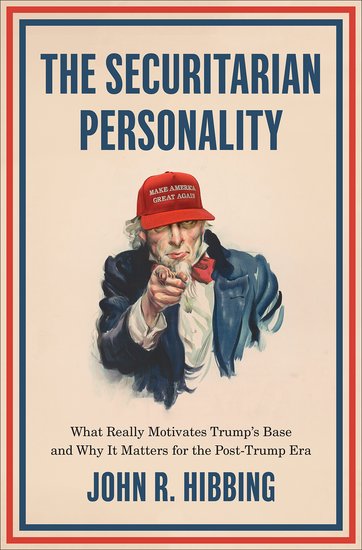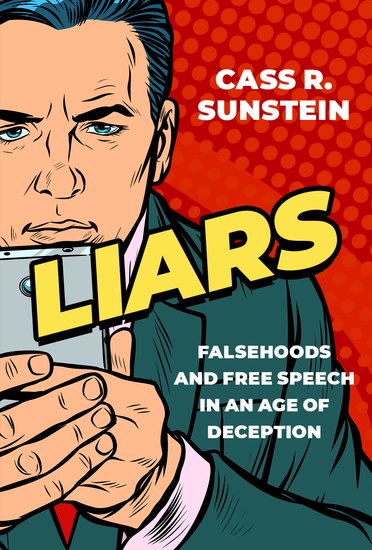The apparent focus of the book The Securitarian Personality by John R. Hibbing is summed up in its sub-title, “What Really Motivates Trump’s Base and Why It Matters for the Post-Trump Era”. That sounded interesting to me, but in reading the book I didn’t find that book really delivered on that. Instead, the book came across to me as trying to promote an ill-defined buzz phrase, securitarian personality, to describe Trump supporters. Here is how the book jacket explains that securitarian personality:
Hibbing demonstrates that what Trump’s base really craves is actually a specific form of security. Trump supporters do not strive for security in the face of all threats, such as climate change, Covid-19, and economic inequality, but rather only from those threats they perceive to be emanating from human outsiders, defined broadly to include welfare cheats, unpatriotic athletes, norm violators, non-English speakers, religious and racial minorities, and certainly people from other countries. The central objective of these “securitarians” is to strive for protection for themselves, their families, and their dominant cultural group from these embodied outsider threats.
There several things that stand out in that for me.
One being that one of the threats they are supposed to be protecting against is norm violators, which is both vague, but also something that Donald Trump certainly could be described as being.
With most of the other threats, they don’t sound different from concerns of conservatives going back decades. At the end of one chapter it is stated that the “chapter suggests that the psychological profile of Trump supporters, or at least Trump voters in 2016, is different from that of run-of-the-mill conservatives”, which conflicts with conservatives overwhelming support of Donald Trump. The never-Trump conservatives were the exception, not the rule.
A major chunk of the book is focused on results of a survey done by the author, who is a professor of political science at the University of Nebraska-Lincoln. With what he refers to as Trump venerators, among a list of things they were asked if they feared, the tops ones were (in the order of the percentage fearing them):
- terrorists attacks
- criminals
- immigrants
- liberals
- countries like China
- the federal government
Beyond sounding like typical conservative fears, they also sound like what Fox News focuses on. Despite the centrality of Fox News to conservatism these days, as well to Donald Trump’s political career, it is never brought up in the book. How can you write about a book about what motivates Trump’s base and leave them out? While Fox News is never mentioned, there is a passing mention of the much less popular One America News Network at the end of the book.
Making the securitarian personality seem even more nebulous, he says that members of the outsider threats will become insiders by perceiving themselves as insiders:
As the decades go by and blacks increasingly perceive themselves as insiders rather than outsiders, the securitarian impulses held by a significant portion of the of the black community, rather than being suppressed, increasingly will be reflected in their political choices, to the detriment of Democratic candidates. Members of the LGBTQ community are likely to show similar voting shifts as societal acceptance grows. More gays will display their securitarian colors by joining with existing Log Cabin Republicans, to the benefit of Republican candidates, or at least those Republican candidates who are not fervent social warriors.
Getting back to the original list of threats, one word you might sum that up with, is racism, but the author doesn’t think that is a good idea:
The description I provide of Trump’s most enthusiastic followers may very well suggest to you that they are dyed-in- the-wool racists but I am going to refrain from calling them that so that I can dig deeper into the specifics of their beliefs and motivations. As Jonathan Haidt points out, labels such as racist are designed to end debates that need to begin.
But he doesn’t get to 10 pages later before writing this:
Trump supporters believe they are not racists because race is only part of their (typically unwitting) assessment of insider status and because under the right circumstances—that is, if racial minorities demonstrate they are trustworthy, contributing members of society and that they are themselves ready to take steps to preserve insiders in the face of outsider threats— they can be fully accepted. Trump supporters need to recognize, however, that to Trump opponents, requiring racial minorities to prove themselves in a way that whites are not required to do is blatant racism.
There are other elements in the book that seem off. At one point he is describing different political orientations and describes populists as “those who see the people of the country as united, homogeneous, and worthy”.
Bottomline
As I have discussed, I think the premise of the book isn’t delivered on, so it isn’t worth reading for that. If you would like to read an extended review of survey results looking at the varying views of people at different parts of the political spectrum, then the book could be something for you.


